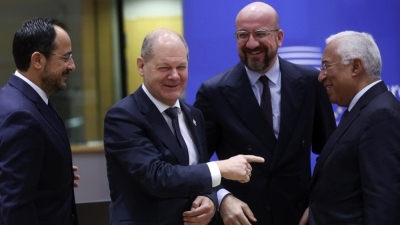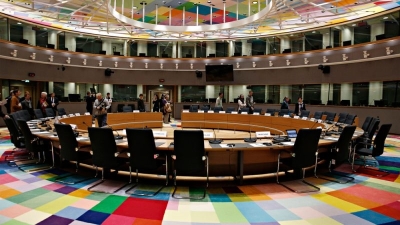Foul play in Bucharest prompts the question of ‘who guards the guardians’

Recent reports from the insurance market in Romania bring to mind fiction from the pen of Mario Puzo. An unfolding dispute between EIG Insurance and the Romanian Financial Supervision Agency (ASF) has the potential to destabilise the entire region, writes Dick Roche.
Recently the Bulgarian Stock Exchange (BSE) has been going through striking changes. On the eve of Saint Valentine’s Day, three of the four main indices on the exchange closed significantly lower, after four months of steady growth.
The drop in the BSE was driven to a significant degree by events in Romania, more specifically by a hostile takeover attempt on Euroins Romania, a part of the Bulgarian-headquartered Euroins Insurance Group (EIG).
EIG Insurance is one of the largest independent insurance groups in Central and Eastern Europe. As of end-2021, it had over 2.5 million customers on its books and a gross premium income of over €700 million.
Eurohold Bulgaria AD, Bulgaria’s largest public company, listed on the Sofia and Warsaw stock exchanges, owns 90% of the EIG capital. Eurohold is a leading financial group operating in Central, Eastern, and South-Eastern Europe with subsidiaries in financial services, general insurance, health insurance, automotive sales, financing and leasing, and the energy sector.
The bulk of the remaining Eurohold shares is owned by the European Bank for Reconstruction and Development, which is in the process of increasing its share in the company – subject to the approval of Romania’s Financial Supervision Agency (ASF).
The operations of Euroins Romania fall under the supervision of ASF, which oversees the operations of the insurance and reinsurance sector in Romania.
Like its counterparts in other EU countries, ASF is responsible for overseeing compliance with the capital and regulatory requirements that apply to insurance companies operating in the EU.
ASF is not only the ‘guardian’ of Romanian standards – it is also meant to be the guardian in Romania of EU standards, including the standards on governance in the insurance sector.
While tensions between supervisory agencies such as ASF and the companies they are charged with overseeing are not uncommon, the friction between ASF and Euroins Romania, as portrayed in material released by Eurohold Bulgaria, goes way beyond the norm.
The relationship between specific players in ASF and Euroins Romania and EIG, as revealed in material that is in circulation, is disturbingly toxic. It reads more like something from the pen of Mario Puzo, the author of ”The Godfather”, than the relationship that should exist between a national financial supervisory agency and a major company with a stable and law-abiding record.
The revelations made by Eurohold Bulgaria AD as reported in EURACTIV and in Bulgarian media are disturbing both in terms of the approach adopted by ASF and in what they suggest about the agency’s internal operations.
The Chairman of the Eurohold Bulgaria Supervisory Board, Ansen Hristov, revealed recently that, at the end of 2019, Euroins Romania was made an offer by the head of ASF to buy a Romanian insurance company, City Insurance.
At the time, Eurohold viewed City Insurance as effectively bankrupt with little value. The company took the view that the “offer” was not serious. However, ASF reportedly made clear to the company’s agents that the offer being made was one that could not be refused and that a refusal would have consequences.
These ‘consequences’ came as a tornado. Inspection teams from the Financial Supervision Agency of Romania became a virtually permanent feature in the offices of Euroins Romania. A negative campaign unfolded in the Romanian media. Accusations were made that Euroins Romania had been tardy in paying out on insurance claims, which is vigorously disputed.
ASF put Euroins Romania into temporary administration with the Insurance Guarantee Fund. The basis for this extraordinary action was that the company’s board members had not been vetted as to whether they had the necessary qualities for their appointments, an allegation again hotly disputed by Eurohold.
Most significantly pressure was exerted on the company to terminate its existing reinsurance contract with a non-EU-based company.
Reinsurance is an indispensable part of every insurer’s activity. Entering into a reinsurance contract is a long and involved process for all the parties. Unilateral termination of a reinsurance contract comes with major negative financial consequences.
Eurohold hotly disputes the basis on which the Romanian regulators required that the reinsurance contract be terminated.
It makes the point that the reinsurance operator deemed unacceptable by ASF had a solid track record and was financially sound, holding its bank accounts in the EU and Great Britain.
It also makes the point that there is no basis in either EU or Romanian law for requiring that the company providing reinsurance be EU-based, an issue raised by ASF. It also claims that the threat made by ASF that it would refuse to recognise the reinsurance violated both European and Romanian law.
A remarkable statement
On 10 February Eurohold issued a press statement remarkable for its forthright language.
The statement is also noteworthy in that it focuses blame for the “attack on Euroins Romania” on “senior and middle management employees” from ASF and on the “persons who caused the crisis with the Romanian insurance company City Insurance”.
It describes the actions of the individuals involved as threatening “the financial stability of the company, the entire insurance sector and the economic stability of the state”, with the potential of “negative impact on the membership of both countries in the Schengen area as well as the entry of Bulgaria into the Eurozone”.
The jitters reflected in the Bulgarian Stock Exchange underscore this view.
The statement characterises the “actions and measures” of ASF personnel as a “gross violation not only of local but also of European legislation” and says Eurohold has alerted the European Insurance and Occupational Pensions Authority (EIOPA) and other European authorities of these actions.
Guardian of the Treaties
Having been present in Bucharest and Sofia during the celebrations on 31 December 2006 and 1 January 2007 to celebrate the accession of Bulgaria and Romania, I witnessed the joy and anticipation in the crowds of people at this auspicious turning point for the two countries.
It would be tragic if the actions of a handful of individuals in a statutory agency were to frustrate the onward march of Romania or damage the economic well-being of Bulgaria.
At a time when the central and eastern EU countries, and indeed the wider EU, are struggling to deal with the war in Ukraine, the potentially huge economic turmoil that could ensue from the ongoing spat in Romania is the last thing they need.
The material released by Eurohold brings Juvenal’s question “who guards the guardians” to mind: If ASF is failing in its ‘guardianship’ role, who will be the guardian? The answer lies in the EU treaties. The European Commission is the “Guardian of the Treaties” and of the principles they enshrine.
A speedy intervention from the Commission is required before an already bad situation becomes worse.



